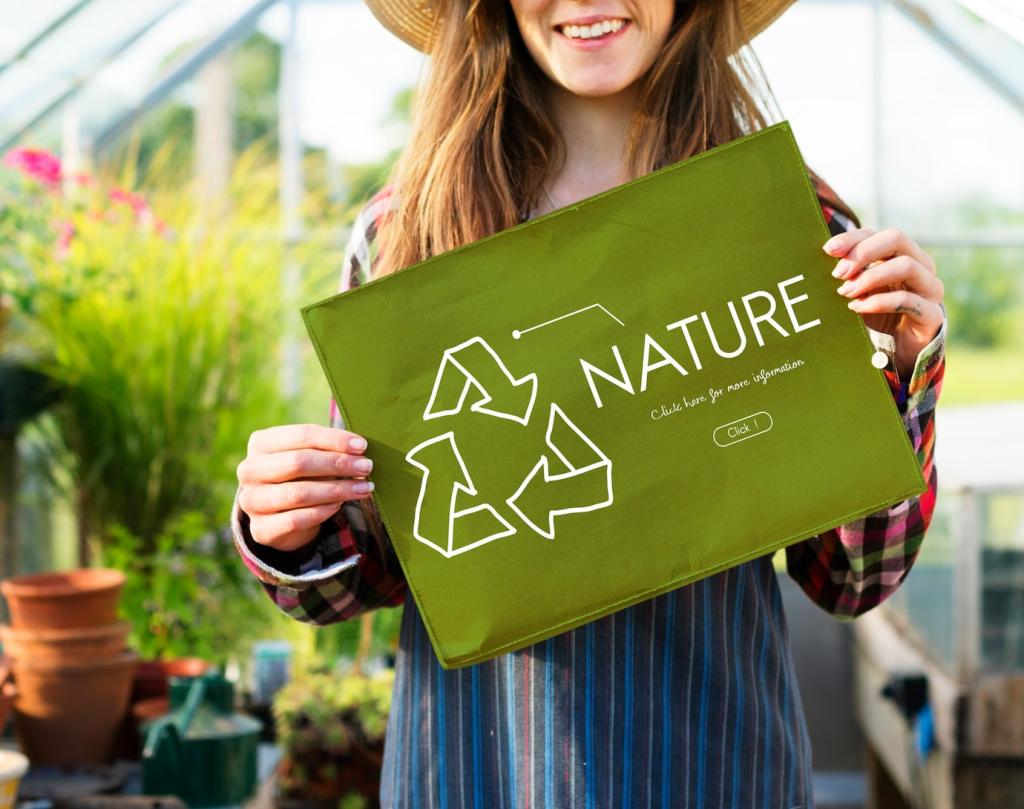
Strategies to Engage Audiences in Sustainable Practices
Chosen theme: Strategies to Engage Audiences in Sustainable Practices. Welcome to a friendly space where practical ideas meet inspiring stories. We explore how to spark action, build habits, and celebrate progress—together. Subscribe for fresh strategies, add your voice in the comments, and help shape a greener culture.
Behavioral Insights That Turn Intent Into Action
Designing Helpful Defaults and Reducing Friction
People often choose the path of least resistance. Make the sustainable option the simplest default—like double-sided printing or automatic recycling bins beside every desk—and watch adoption rise. Share a default you changed recently and whether it truly made greener behavior feel effortless.
Using Social Norms Without Shaming
Showcase real neighbors or coworkers saving energy and reducing waste, emphasizing community pride rather than guilt. Social proof nudges curiosity and builds momentum. Have you seen a respectful social comparison motivate change in your workplace or neighborhood? Tell us how it felt and what improved.
Timing Prompts With Moments That Matter
Send gentle reminders at decision points—Sunday evenings before shopping, or Monday mornings when commute habits are forming. Align with fresh-start moments like a new month or semester. What timing cues work best for you? Comment with your ideal reminder window and why it helps you act.





Meaningful Points, Streaks, and Rewards
Reward actions that matter—refills instead of single-use, transit over solo driving, plant-rich meals on weekdays. Offer badges tied to real impact and public recognition. What reward would keep you engaged for six months straight? Suggest one that aligns with purpose, not just novelty.
Team Play and Friendly Rivalries
Departments, classes, or street blocks can compete cooperatively. Highlight shared wins: fewer trash pickups, lighter utility bills, cleaner air. Healthy rivalry strengthens belonging. Invite your group to a two-week challenge and report your first-day tactic for recruiting friends with enthusiasm and kindness.
Habit Loops and Micro-Commitments
Pair cues with tiny actions: place a tote by the door, pre-pack a mug near the keys, draft a transit plan Sunday night. Celebrate repetition over perfection. What micro-commitment will you try this week? Declare it publicly here and we’ll cheer your first three repetitions.
Training Ambassadors and Peer Mentors
Equip volunteers with facilitation skills, clear toolkits, and simple engagement scripts. Peer mentors spread practical wisdom faster than flyers. If you became a green ambassador tomorrow, which topic would you lead first, and what single-page guide would help you feel confident?
Co-Creation Over Top-Down Mandates
Host listening sessions, map barriers with residents, and pilot solutions that locals choose. When people help design the change, they sustain it. Share one barrier your community faces—cost, access, or time—and propose a co-created fix we could test within thirty days.
Inclusive Events and Accessible Materials
Offer childcare, translation, food, and varied meeting times. Use plain language, large visuals, and hands-on demos. Inclusion multiplies engagement. What would make your next sustainability event easier to attend? Suggest one accessibility upgrade we can adopt for our upcoming community meetup.
Designing Frictionless Sustainable Choices
Surface plant-rich meals at the top of menus, default to eco shipping, and provide one-tap transit routes in apps. Prominence reduces cognitive load. Where could a single click replace five? Describe one interface that could spotlight the sustainable option at exactly the right moment.
Designing Frictionless Sustainable Choices
Use color-coded bins, icons, and concise verbs. Frame choices transparently—“low-carbon, standard, express.” Remove confusing duplicates. What label would have saved you from a recycling mistake last week? Draft a five-word prompt that would guide a distracted person to the right bin instantly.

Measuring Impact and Sharing Feedback Loops
Define Metrics That Matter to People
Translate data into everyday benefits: dollars saved, hours of clean air, meals rescued, or kilometers biked. Connect outcomes to shared values. Which metric would convince your skeptical friend to try a greener habit? Propose a metric that balances accuracy, clarity, and emotional relevance.
Transparent Dashboards and Celebrations
Post weekly progress, recognize contributors by name, and celebrate milestones with community shout-outs. Visibility builds trust and momentum. What milestone should we aim for next month? Nominate a target and a fun, low-waste way we can celebrate once we collectively reach it.
Learn Fast With Experiments
Run small A/B tests on message wording, timing, or placement. Share what worked—and what didn’t—so everyone levels up. Suggest a tiny experiment we could start tomorrow, and volunteer to help gather feedback from three friends or colleagues who will try it honestly.
Incentives, Recognition, and Long-Term Retention
Offer rewards that deepen purpose—workshops, skill badges, or donations to local projects in participants’ names. Avoid incentives that overshadow the mission. What purposeful reward would feel genuinely motivating to you six months from now, long after the novelty has faded?
Incentives, Recognition, and Long-Term Retention
Spotlight contributors in newsletters, host gratitude circles, and create digital walls of fame. Recognition signals, “People like us do things like this.” Nominate someone who deserves a thank-you this week and share the specific action they took that inspired you to act too.
